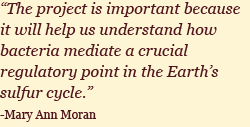Do Plankton Help Fight
Global Warming?
A team of researchers from the University of Georgia, led by marine microbial ecologist Mary Ann Moran, discovered in 2006 a bacterial “switch gene” in two groups of bacterioplankton, which form sulfur compounds. The new gene offers a powerful tool for studying if and how the microorganisms are involved with ocean-atmosphere sulfur exchange, thereby affecting global warming, or whether their products remain—climatically inactive—in the sea, where they boost marine productivity.
 The National Science Foundation has now awarded a grant of nearly $865,000 so that a team led by Moran, UGA microbiologist Barny Whitman, and Ronald Kiene, a professor of marine sciences at the University of South Alabama, may extend the work reported last year.
The National Science Foundation has now awarded a grant of nearly $865,000 so that a team led by Moran, UGA microbiologist Barny Whitman, and Ronald Kiene, a professor of marine sciences at the University of South Alabama, may extend the work reported last year.
“The project is important because it will help us understand how bacteria mediate a crucial regulatory point in the Earth’s sulfur cycle,” said Moran. “If they degrade organic sulfur compounds to DMS [dimethyl sulfide], this ‘anti-greenhouse’ gas can be released from the ocean to the atmosphere, where it encourages cloud formation and decreases solar penetration to the Earth’s surface. We need to understand why bacteria would choose this pathway over alternate routes for degradation, since it would have such important implications for global temperature regulation.”
The new project will feature “environmental functional genomics,” an approach in which gene-expression patterns are used to address ecological questions, to get at this question. “We will study gene expression in complex marine bacterial communities consisting of thousands of species that have never been cultured,” said Moran.
In addition to the researchers’ work, graduate and undergraduate students and two postdoctoral fellows will be trained during the course of the grant, and high-school biology students in Athens will learn firsthand about marine microbiology. The student’s agenda includes studies in bacterial diversity on the Georgia coast, follow-up training in molecular tools and bioinformatics in their own classroom, and summer internships at UGA and the Dauphin Island Sea Lab in Mobile Bay.
For more information, contact Mary Ann Moran at: mmoran@uga.edu
 |

